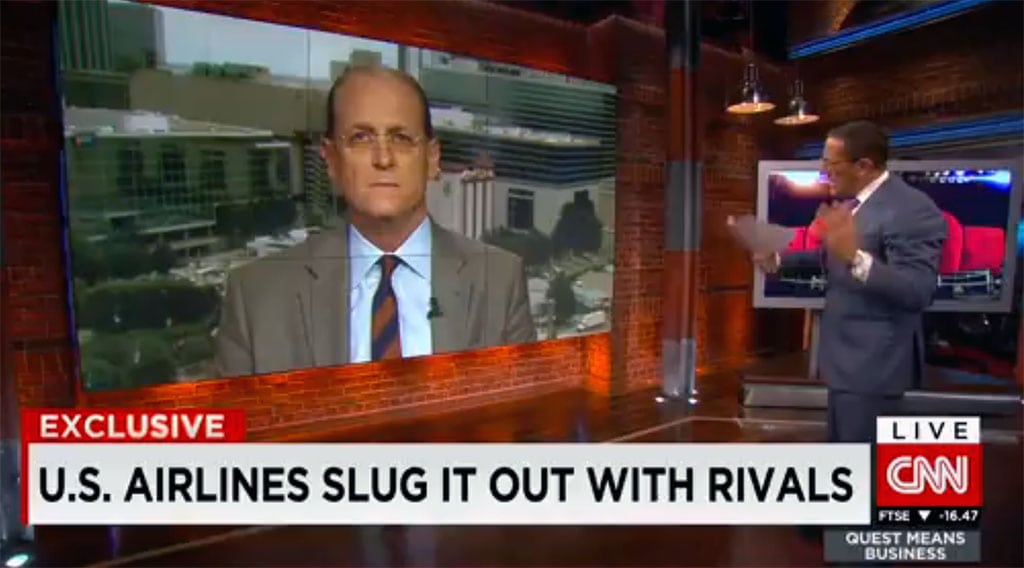Skift Take
There's an argument to be had here about state aid for airlines, but this isn't it. You know you're losing the debate when you try to link your opponent to 9/11.
Delta CEO Richard Anderson raised the rhetoric today — or lowered it, depending on your perspective — in the increasingly acrimonious debate between legacy airlines Delta, United, and American Airlines, and their rivals Etihad, Emirates, and Qatar Airways, often referred to collectively as the Gulf carriers.
In an interview with CNN’s Richard Quest [embedded below], Anderson said it was ironic of Gulf carriers to suggest that bankruptcy protections equalled government assistance since the Gulf region was the source of the Sept. 11, 2001 attacks that hurt the airline industry in the U.S.
The exchange between Quest and Anderson went as follows:
Richard Quest: To the allegation that, well, you restructured under chapter 11. The U.S. fleet certainly gains benefits from the civil defense fleet. American has just restructured. The argument is that you, in your own ways, have had your hand in the bailout trough.
Richard Anderson: That is categorically false. And it’s a great irony to have the UAE from the Arabian Peninsula talk about that, given the fact that our industry was really shocked by the terrorism of 9/11, which came from terrorists from the Arabian Peninsula. That caused us to go through a massive restructuring. And in the United States our restructuring process is transparent and there is no government subsidy. And in fact there were billions of dollars of equity and unsecured debt that were wiped out through that process.
Watch the full interview, below.
Fifteen of the of 19 hijackers on 9/11 were citizens of Saudi Arabia. Saudia, the state airline of Saudi Arabia, does not compete at the same level as Etihad, Emirates, or Qatar Airways. Etihad Airways was founded in 2003.
Quest was referring to the series of bankruptcies that have plagued U.S. airlines over the last decade. Delta filed for bankruptcy in 2005 and emerged in 2007 after shedding assets and debts and renegotiating contracts. American Airlines was in bankruptcy starting in 2011 and left in December 2013 as part of its acquisition by US Airways. United Airlines filed for bankruptcy in 2002 and left in 2007. It merged with Continental in 2010 and has struggled since then.
More on the Open Skies Debate:
- The U.S. Airlines’ Hypocrisy on Protectionism in the Skies
- U.S. Airport Group Sides Against Airlines in Open Skies Battle
- The Battle Over Open Skies Forces U.S. Tourism Industry to Choose Sides
Anderson’s contentious comments reveal an increasing frustration that legacy U.S. carriers are having with competition from the Gulf. Anderson and his fellow CEOs at United and American Airlines are adamant that governments in Dubai, Abu Dhabi, and Qatar are providing massive subsidies to their airlines in order to better compete in the global aviation market.
In today’s interview, Anderson said Delta, United, and American had spent two years going over financial statements that revealed “Documented evidence that can’t be refuted of tens of billions of dollars in direct government subsidies.” At another point in the interview he says this amount is “$40 billion in subsidies, much of which is direct cash subsidy.”
Anderson said that a 55-page report has been given to the administration of U.S. President Barack Obama with the evidence and the complaints. This report has not been made public.
We have invited the CEOs of @emirates @EtihadAirways @qatarairways to be on Quest Means Business in response. All are welcome.
— Richard Quest (@richardquest) February 16, 2015
Last week, both the chairman and the president of Emirates made statements suggesting that U.S. carriers wouldn’t have problems if customers enjoyed flying their planes.
“Offer the best to the passengers and people will fly with you,” Sheikh Ahmed said in an interview with Bloomberg at his office at Dubai International Airport.
At one point in today’s interview, Quest suggests to Anderson that his complaints may not matter to consumers, stating, “Everyone would accept they give superb service and quality of flight, so you’re not necessarily going to have the consumer on your side.”
Anderson responded by stating that passengers care about competition.
Full interview:
The Daily Newsletter
Our daily coverage of the global travel industry. Written by editors and analysts from across Skift’s brands.
Have a confidential tip for Skift? Get in touch
Tags: american airlines, delta air lines, emirates air, etihad, gulf carriers, open skies, qatar airways, united airlines
Photo credit: Delta CEO Richard Anderson appearing on CNN with Richard Quest. CNN
